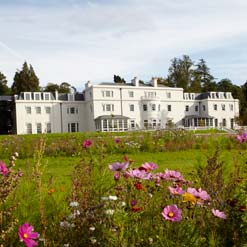My new kitchen: John Campbell at Coworth Park
It's every chef's dream: to be given a multi-million pound budget and a blank canvas to build a kitchen from scratch. That's what has been keeping chef John Campbell busy at the Dorchester Collection's Coworth Park. He shows James Stagg round his new kitchen
It's rare for any chef to be offered a completely blank canvas in which to design and build a kitchen. So to have eight months in which to consider every detail must seem positively luxurious.
But such is the magnificence behind the development of the Dorchester Collection's Coworth Park that John Campbell has been given all the time, and a multi-million pound budget, required to make sure that the kitchen is as efficient and suited to his methodology and food style as possible.
"It's an amazing opportunity to start with a blank canvas," Campbell explains. "You can get something that is incredibly close to how you operate as a chef. We can build a kitchen that suits the brand and the style of food."
| !](https://cdn.filestackcontent.com/dBmFdAWQWqQVrCJRzk6w) |
|---|
| ###### The Bonnet Maestro range has built-in Clifton water baths |
Surprisingly - given the scope of service required of the hotel kitchen - the space is smaller than the Vineyard at Stockcross, the restaurant with rooms at which Campbell had such success. Not only does the new kitchen serve the 38-seat à la carte John Campbell at Coworth Park, but also two 90-cover private dining rooms, the hotel's Tower House and a marquee on the lawn that can cater for 350. "It's a little smaller [than the Vineyard at Stockcross] but over time you learn how to get more out of a kitchen," Campbell says. "The space we have here is real estate and we need to get the maximum productivity from each square metre. We have been quite clever in the way the kitchen has been designed to suit the property."
That design process was as rigorous as you would expect from a chef well known for his painstakingly meticulous approach to the business of running a kitchen. It took eight weeks to work with the designers to establish and refine a design, and a further eight months before the kitchen was fully operational.
"We wanted to design a kitchen with the future in mind, so we needed to forecast where the food style is going," Campbell adds. "We're using new equipment, new cooking methods and new routes to market - how we're getting it from the gate to the plate - because we've had 12 months to consider it. That has dictated the design."
| 










